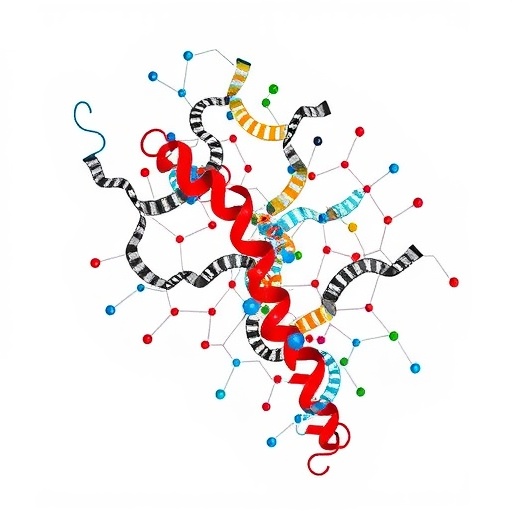In a groundbreaking study that pushes the boundaries of genetic research, scientists have unveiled a comprehensive landscape of genetic loci influencing a broad spectrum of traits by analyzing a large Korean cohort. This ambitious genome-wide association study (GWAS) casts new light on the intricate genetic architectures underpinning human phenotypes, expanding our understanding far beyond previous investigations conducted predominantly in European populations.
Traditionally, GWAS have focused heavily on populations of European descent, imposing significant limitations on the generalizability and applicability of genetic findings worldwide. The latest research, conducted by Jee, Wang, Jung, and colleagues, leverages an expansive dataset derived from a meticulously curated Korean cohort, enabling a deep dive into the genetic basis of 36 quantitative traits ranging from metabolic measurements to anthropometrics and hematological indices. This inclusive approach not only addresses scientific disparities but also enriches the global genomic knowledge base.
The study’s methodological rigor stands out, utilizing state-of-the-art genotyping platforms combined with advanced imputation techniques to ensure high-resolution genetic variant detection. The researchers employed stringent quality control and robust statistical frameworks designed to mitigate population stratification and confounding effects. This allowed for a more precise identification of quantitative trait loci (QTLs), genomic regions harboring variants significantly associated with continuous traits, thereby enhancing the reliability of their findings.
Among the 36 traits analyzed, the authors uncovered numerous novel loci previously unreported in other ethnicities, highlighting the unique genetic landscape present in East Asian populations. This discovery underscores the imperative need for diverse genomic research initiatives to capture population-specific variants that can influence health outcomes, disease susceptibility, and therapeutic responses.
Delving into the traits themselves reveals a multifaceted genetic architecture characterized by heterogeneity and polygenicity. The identified QTLs vary in effect size and allele frequency, reflecting evolutionary histories shaped by demographic events and environmental pressures unique to the Korean peninsula. This provides an invaluable lens through which to interpret how complex traits are orchestrated at a molecular level.
The integration of functional annotations further enriches the biological interpretability of the results. By overlaying QTLs with epigenomic marks and gene expression profiles, the study reveals tissue-specific regulatory mechanisms potentially driving phenotypic variability. This integrative approach aids in prioritizing candidate genes and pathways for follow-up functional validation, paving the way toward unraveling causal mechanisms.
Moreover, the authors examine pleiotropy, where single variants impact multiple traits, illustrating the interconnected nature of biological systems. Their findings offer compelling insights into shared genetic underpinnings and metabolic networks, which could have substantial implications for understanding comorbidities and developing precision medicine strategies tailored to individuals of East Asian descent.
The implications of this research extend into clinical realms, particularly in improving polygenic risk scores (PRS) that predict disease susceptibility. By incorporating ethnically relevant variants identified from the Korean cohort, the accuracy and applicability of PRS can be drastically improved in non-European populations, potentially revolutionizing personalized healthcare interventions and risk assessments.
In addition to offering a wealth of genetic associations, the study serves as a powerful resource for future meta-analyses and cross-population comparisons. It sets a new benchmark in cohort size and phenotypic breadth for East Asian genetic research, facilitating collaborative efforts to disentangle complex genotype-phenotype correlations on a global scale.
The researchers also underscore the importance of continued investment in diverse biobanking initiatives and data-sharing frameworks, advocating for equitable representation in genomic databases. Such efforts are critical to unlocking the full potential of genomic medicine and ensuring that health benefits derived from genetic discoveries are distributed broadly across all populations.
This study exemplifies the convergence of cutting-edge genomics with large-scale population sampling, harnessing computational advances and big data analytics to deepen our grasp of human biology. By characterizing the genetic architecture of numerous traits in an understudied population, it bridges essential knowledge gaps and opens new avenues for biomedical innovation.
Importantly, the study’s findings prompt a reconsideration of how genomic data informs public health policies and medical guidelines, emphasizing tailored approaches that recognize ethnic diversity. This perspective is crucial for addressing health disparities and optimizing interventions across different demographic groups.
The publication also sparks a conversation about ethical, social, and legal considerations inherent in population genomics, particularly regarding data sovereignty, informed consent, and equitable benefit-sharing, which are paramount when working with indigenous and regional communities.
In summation, this seminal work propels the frontier of GWAS by harnessing the power of a large Korean cohort to elucidate the genetic determinants of 36 complex traits. It not only enhances our understanding of genetic diversity and its functional consequences but also reinforces the imperative for inclusive research designs in achieving global health equity. The ramifications of this study will resonate through future genetic epidemiological investigations and personalized medicine paradigms alike.
Subject of Research: The genetic architecture of 36 quantitative traits explored through genome-wide association studies in a large Korean cohort.
Article Title: Genome-wide association studies in a large Korean cohort identify quantitative trait loci for 36 traits and illuminate their genetic architectures.
Article References:
Jee, Y.H., Wang, Y., Jung, K.J. et al. Genome-wide association studies in a large Korean cohort identify quantitative trait loci for 36 traits and illuminate their genetic architectures. Nat Commun 16, 4935 (2025). https://doi.org/10.1038/s41467-025-59950-5
Image Credits: AI Generated




